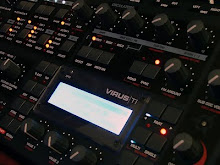Enough about set-ups. Up to this point I hope I cleared some of the confusion about what to get for this and that in the studio. Now it's time "to get to business" :)
There are 4 areas of expertise you need to learn and experiment with in order to produce music:
- SOUND SYNTHESIS and THE USE OF EFFECTS
- TECHNICAL STUFF dealing with the use of hardware and software that make-up your set-up
- MUSIC COMPOSITION
- MIXING and MASTERING
SOUND SYNTHESIS is an art in itself. The art of generating and sculpting the sound. For an electronic musician I believe it's very important. As important as the composition. Some producers tend to ignore this side of production and use mainly presets or samples. It is their way, of course, but my opinion and others is that they will lack personality and the stamp of uniqueness. Anyway, the sound designer is a professional in his own way. The use of effects (mistakenly taken as sound synthesis), completes the sound synthesis precess, adding the last touch on the sound created.
"THE TECHNICAL STUFF" is the learning of how the tools work and getting the flow of production as smooth as posssible. It takes sometime, but the clearer you are about the set-up, the faster it will be because you will not waste time changing and learning different tools that you'll eventually drop in the process. (It took me more than 4 years ;)
MUSIC COMPOSITION is the area at which all producers look for when starting production, but unfortunatelly it's kind of a long way until all the pieces of the puzzle are put together, so finally they start making some music. One reason for this blog is this. I want to help you get as soon as possible into the real music composition, waisting as litlle time as possible on trial and error about what to get and learning stuff you will not use in the end.
Finally MIXING and MASTERING. In order to make your music sound good, and I don't mean only texture and composition, but getting a clean, full mix, you have to learn the art of mixing and of course mastering. These have to do mainly with volume, panning, equalizing and compression.
So, first you have to learn your chosen tools as good as possible and to create a workflow which makes you comfortable. In time, the more you will work, the better you will get. At the begining you'll have to experiment quite a bit.
Next in line is making your sounds. For that you'll have to learn some sound synthesis which is not really hard in the basic phases, but you'll need patience and if you want to get advanced at it, let me tell you: that's no easy task. There are endless possibilities with synthesis, but that's the beauty of it anyway. Also you'll need to learn what does each basic parameter from each effect and also how a sample is edited in sampler. These things will prove invaluable in the process of production.
At this point you'll be ready for the actual composition :) Some music theory it may help for certain, but there are numerous producers that learned a lot just by trial and error. I would advice on a combination of the two above methods. At composition, it's a matter of both talent and experimentation. For these there is no one that can teach you, even though basics taught by someone to you can speed up the learning process. The main idea at both composition and sound synthesis is not to settle for mediocrity.
The final step is the mixing(& mastering) process. Here a professional would be of great help, at least until you learned the basics and how to use effectively your ears. The main idea at this stage is to give each sound enough space in the frequency spectrum, so not to overlap with the other sounds. This can be achived with the use of volume control, panning and equalization. Also of great use is side-chain compression. Finally you need to use compression to make your mix sound full. Nowadays, the compression is overused, especially with the electronic, club music, and yes, sometimes for the better :)
Good luck and enjoy your journey!
miercuri, 28 octombrie 2009
Abonați-vă la:
Postare comentarii (Atom)



Acest comentariu a fost eliminat de administratorul blogului.
RăspundețiȘtergere